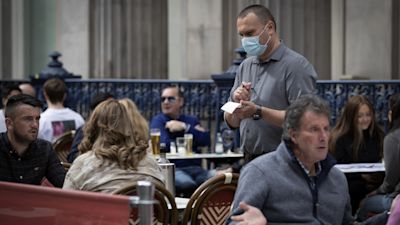Insight
Vacancies at a record high but hotels and pubs warn of job losses as Omicron spreads

The concern was the end of the furlough in September would trigger a sharp rise in the number of people out of work. It didn’t. Squint hard and you can see what looks like the end of furlough in the October data - the monthly numbers show employment dipped and unemployment rose.
But in November the number of people on company payrolls was 424,000 above its pre-pandemic level, benefits claims eased down, and the number of vacancies in the economy remained at a record high level. The evidence is compelling. The Job Retention Scheme ended with a murmur, the majority of the one million people still claiming furlough when taxpayer support was withdrawn appear to have remained in work. The labour market looks tight. An extraordinary 41% of firms with more then ten staff say they are struggling to recruit but prices are growing at a faster pace than pay. In November, the Bank of England indicated it was preparing to rate interest rates to contain high inflation. On the face it, the coast is now clear to do that, but the emergence of Omicron complicates things again. Clearly a surge in Covid cases will have a negative impact on growth, but to what extent is impossible to judge. The International Monetary Fund (IMF) is in town. It will, understandably, shrug its shoulders when asked how serious Omicron looks.
We have learned to adapt to life with the virus but a significant minority of companies report that Plan B is hurting them. Hotels, pubs, bars, gyms and restaurants say their customers are disappearing into their rabbit holes again at a time when they need them to be out and about and spending freely. Airlines and airports say the new travel restrictions and testing requirements have had damaged bookings. Many of these businesses already bear the scars and the debts of 22 months of setbacks, frustrations and losses. Best Western has more than 300 hotels in the UK. There has been in increase in cancellations at 98% of sites since Plan B was announced on the 8th December. The chief executive, Tim Rumney, calls it “lockdown by stealth”. Without additional taxpayer financial support, he predicts unemployment will rise again in 2022. “Expected revenue is down between 30-50% compared to Q1 2019. That is hugely, hugely worrying,” Mr Rumney says.
“We won’t recover those bookings, so we are now facing a New Year of Fear as people in hospitality understandably start to worry about their jobs and their businesses the other side of Christmas”, he added. By raising interest rates the Bank of England would be hoping to cool demand for labour, keeping a lid on wages and therefore inflation. Omicron may be about to do that for them. The tone and the news flow around the virus is concerning. The market no longer expects Bank Rate to go up on Thursday.